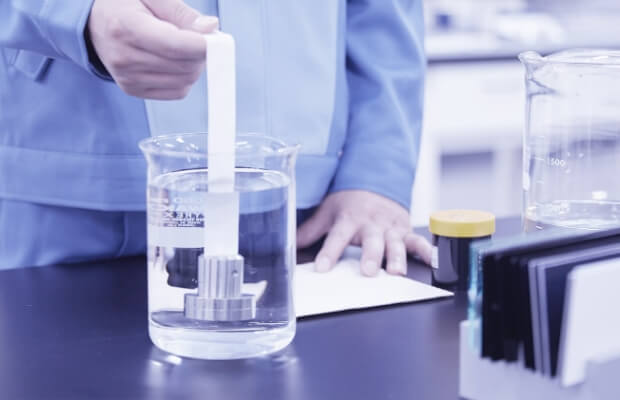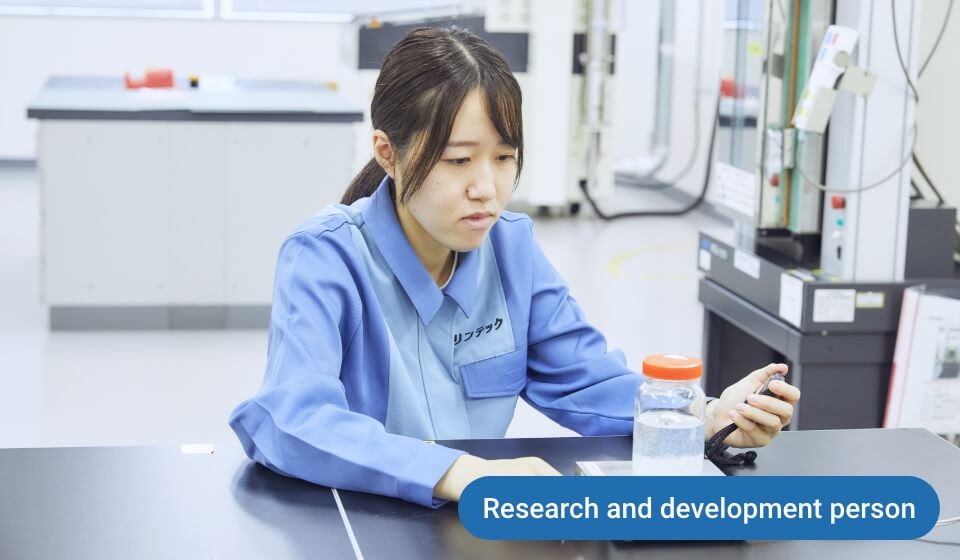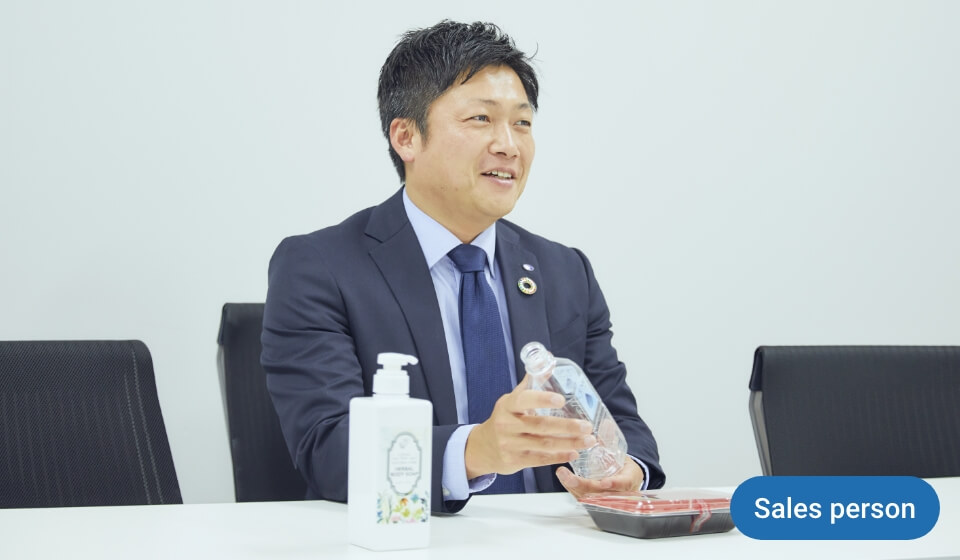-
Featured products
Featured products
- Returnable labelstocks (film-based material) for alkaline hot water
- Half-Metalized labelstock
- Hot-melt adhesive labelstocks
- Mono-material labelstocks
- Plastic-alternative labelstocks direct thermal type
- High smoothness glassine release paper labelstocks
- Environmentally friendly labelstocks
- Labelstocks for chilled environments

Returnable labelstocks (film-based material) for alkaline hot water
This labelstock cleanly washes off of the used plastic containers during the washing process after collection.

Half-Metalized labelstock
This labelstock achieves a metallic look, while enabling transparent designs as it allows light to pass through.

Hot-melt adhesive labelstocks
Labelstocks using high adhesion type hot-melt adhesive will be developed as the HVT Series, to reduce CO2 emissions during label production and disposal.

Mono-material labelstocks
Making the labelstock's facestock and the adhesive layer from materials that match the adherend to create a mono-material (a single material) improves recyclability.

Plastic-alternative labelstocks direct thermal type
This is a direct thermal type in the PLALESS Series of plastic-alternative labelstocks.

High smoothness glassine release paper labelstocks
Labelstock using glassine release paper with high smoothness without polyethylene lamination.

Environmentally friendly labelstocks
These environmentally friendly labelstocks meet a wide range of needs, including to reuse, recycle, and reduce, which are increasing as environmental awareness has grown in recent years.

Labelstocks for chilled environments
This labelstock is excellent for applying to rough surfaces and condensation/frost-covered surfaces in a chilled environment (-5 to 5°C), and complies with Japan's Food Sanitation Act (positive list system).
-
Search by industry
Search by industry

Daily use
General labels, flap labels, eye-catching labels

Industrial use
Nameplate labels, warning labels, labels for tires

Food and beverage use
Food and beverage use

Medical and pharmaceutical use
Labels for ampoules and syringes

Stationery use
General labels, sticky notes, character stickers

Logistic use
Address labels and labels for plastic containers
-
Search by function
Search by function

Antiviral properties
SIAA-registered over-laminate films with antiviral and antibacterial properties.

Antibacterial
Over-laminate films with SIAA-registered antibacterial properties.

Food safety
Labelstocks using adhesive compliant with Japan's Food Sanitation Act.

Oil tolerant
Labelstocks that can be firmly affixed even to oily surfaces.

Outgassing resistant
Labelstocks that do not suffer swelling due to outgassing from molded plastic products.

Low temperature condensation surface suitability
Labelstocks that can be firmly affixed even in low-temperature environments.

Removability
Labelstocks that can be removed cleanly.

Security
Labelstocks ideal for personal information protection and security measures.

For rough surfaces
Labelstocks that can be firmly affixed to rough or uneven surfaces that would ordinarily make them peel off easily.

Bubble-free labelstocks
Easy-to-affix labelstocks that prevent air from getting under the label during application.

Conformability
Labelstock that can be firmly affixed to curved surfaces without lifting.

Squeezable
Labelstocks that do not peel or wrinkle easily even when the container is dented.

Heat resistance
Labelstocks that withstand processes and environments where heat is applied.

Decorative
Various textured labelstocks to complement products.

Abrasion resistance
Over-laminate films to protect printed surfaces from abrasion.

Microwave resistance
Labelstocks that withstand microwave heating.
-
Environmentally friendly labelstocks
Environmentally friendly labelstocks TOP
- Hot-melt adhesive labelstocks
- Mono-material labelstocks
- Plastic-alternative labelstocks
- FSC®-certified labelstock
- Labelstocks for plastic containers
- Returnable labelstocks
- Removable labelstocks
- Recycled PET labelstocks
- KEE and KEP Series
- Labelstocks for chilled environments

Environmentally friendly labelstocks
These environmentally- friendly labelstocks meet a wide range of needs, including to reduce, reuse, and recycle.

Hot-melt adhesive labelstocks
Labelstocks using high adhesion type hot-melt adhesive will be developed as the HVT Series, to reduce CO2 emissions during label production and disposal.

Mono-material labelstocks
Making the labelstock's facestock and the adhesive layer from materials that match the adherend to create a mono-material (a single material) improves recyclability.

Plastic-alternative labelstocks
This is a direct thermal type in the PLALESS Series of plastic-alternative labelstocks.

FSC®-certified labelstock
These products contribute to responsible forest management with labelstocks made raw materials from properly-managed FSC®-certified forests, recycled resources, and other managed sources.

Labelstocks for plastic containers
This labelstock is firmly affixed applyed during the shipping process and can be easily removed after use by washing with warm water, contributing to ease of reuse.

Returnable labelstocks
This labelstock cleanly washes off of the used plastic containers during the washing process after collection.

Removable labelstocks
Labelstocks that can be removed cleanly.

Recycled PET labelstocks
Mechanically recycled PET film made from used PET bottles is used as raw material for the facestock.

KEE and KEP Series
Same materials as plastic molded parts (PE and PP) used in daily commodity containers.

Labelstocks for chilled environments
This labelstock is excellent for applying to rough surfaces and condensation/frost-covered surfaces in a chilled environment (-5 to 5°C), and complies with Japan's Food Sanitation Act (positive list system).
-
Variable-information printing labelstocks

Variable-information printing labelstocks
Labelstocks for variable information printing from our diverse lineup according to the output method of your printer.

Labelstock for inkjet printing LJ/FJ Series
Special ink is ejected as droplets sprayed from nozzles and adheres to the output material.

Xerographic printing labelstocks LN/FN series
A method in which the toner is deposited electrostatically bonded to on the drum and then transferred to the output material.

Direct thermal printing labelstocks LD/FD series
Heat causes heat-sensitive paper to self-color.

Thermal-transfer printing labelstocks LR/FR/HR series
Heat causes ink from an ink ribbon to transfer to the output material.
-
UL/CUL certified products

UL/CUL certified products
Labelstocks for variable information printing from our diverse lineup according to the output method of your printer.
-
Digital printing labelstocks

Digital printing labelstocks
各種デジタルラベル印刷機による印刷テストをクリアしたラベル素材
About our Labelstock
R&D Organization
- Mono-material labelstocksAchievement of mono-materials with PET containers
- Plastic-alternative labelstocksA big step toward a sustainable society with PLALESS

「貼る」のさらに先へ。
開発しているのはラベルの未来ですラベルで社会はより良い方向に変えられる、私たちはそう信じています。

Mono-material labelstocksAchievement of mono-materials with PET containers
The key to efficient recycling was to use mono-material for the container and to provide ink removal functionality during the washing process.

Plastic-alternative labelstocksA big step toward a sustainable society with PLALESS
A product born from the fusion of water-resistant paper and adhesive technology that meets the demand for plastic-free products
Videos
Search Within Site
You will be redirected to the Lintec Corporation website and the search results will be displayed.





